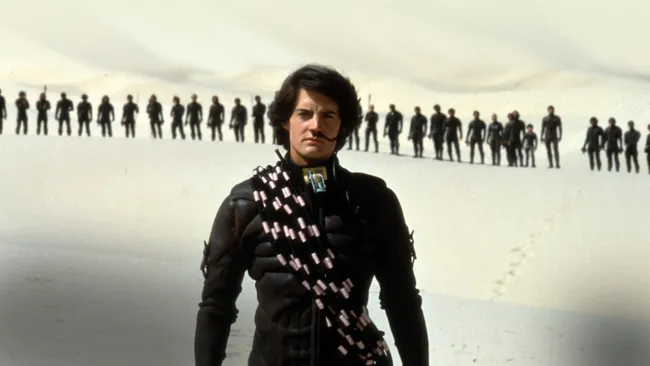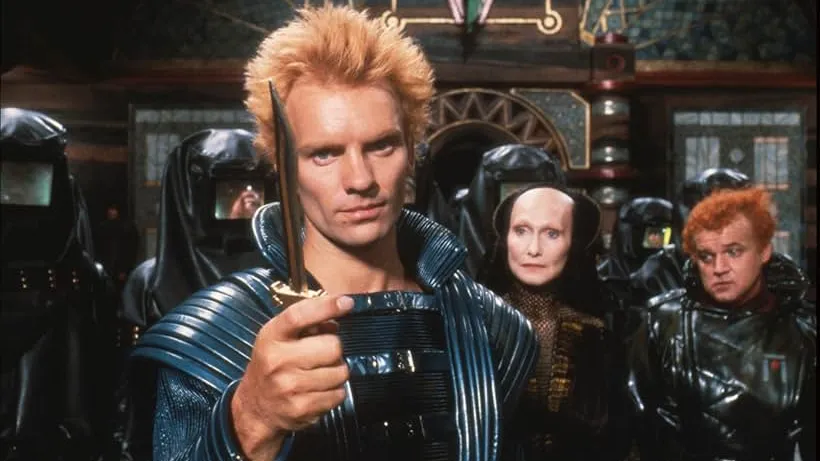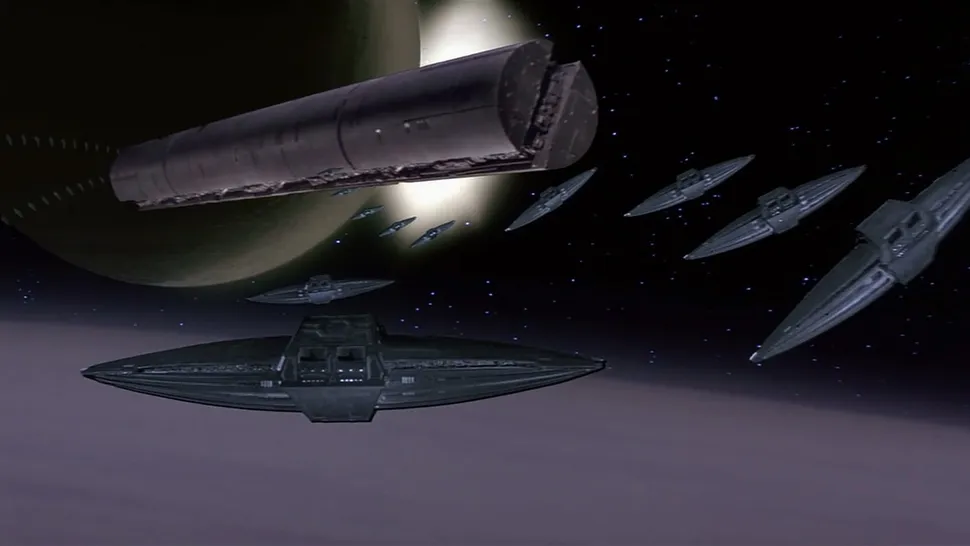
Posted on 12/30/2024 6:07:40 AM PST by Red Badger
Squeezing Frank Herbert's classic sci-fi novel into a two-hour movie was always doomed to misfire.

(Image credit: Universal Pictures)
Frank Herbert's sprawling sci-fi novel was never likely to be tamed in the space of a single movie. Now that "Dune: Part Two" has completed Denis Villeneuve's spice odyssey in box-office smashing style (until the director gets round to making "Dune: Messiah", at least), it's more obvious than ever that David Lynch's 1984, single-film adaptation of a crown jewel of genre literature was always as doomed as poor Leto Atreides. Nonetheless, four decades later the director's version of "Dune" remains an intriguing, if seriously weird, misfire.
In a parallel universe, Lynch might have made "Return of the Jedi" instead. The director, then the toast of Hollywood thanks to his work on the Oscar-nominated "The Elephant Man", ultimately turned down George Lucas's offer of a trip to a galaxy far, far away. But it wasn't long before he was hitching another ride into outer space, bankrolled by eccentric "Flash Gordon" producer (and subject of many a Hollywood anecdote) Dino De Laurentiis.
Like "Flash Gordon", "The Black Hole", "Krull" and numerous other sci-fi/fantasy movies of the era, "Dune" 1984 was at the vanguard of Hollywood's effort to cash in on the phenomenal success of "Star Wars". There's a degree of irony, then, that it's Villeneuve's movies that take more inspiration from Lucas's beloved trilogy, effectively bringing things full circle after "Star Wars" borrowed liberally from Herbert's desert planet setting and "kid with a messianic destiny" plot.

(Image credit: Universal Pictures)
Where Villeneuve doubled down on Lucas's gritty, used aesthetic to create a believable space-faring universe — a stylistic choice that's become the blueprint everywhere from "Alien" to "Rebel Moon" — Lynch's more fantastical film embraces the absurd. With their implausibly ornate eyebrows, the mentats (human computers) look like something out of a Terry Gilliam movie, while the costumes lean towards the elaborate — there's no question Lynch's Arrakis exists in a similar orbit to "Flash Gordon"'s Mongo.
The portrayal of the tyrannical Harkonnens is particularly egregious, their ludicrous bright orange hair and penchant for the theatrical ensuring they never convince as the villains of the piece.
Kenneth McMillan effectively plays the grotesque patriarch Baron Vladimir for laughs, creating a jarring contrast with the character's casual cruelty. Sting, meanwhile, brings plenty of rock star energy to the psychotic heir apparent Feyd-Rautha, but — largely thanks to his bizarre, highly-memeable choice of underwear — he's no Darth Vader. Neither can compete with Villeneuve's chilling, hairless reimagining of the most despised family on Arrakis — Stellan Skarsgård (as the Baron) and Austin Butler (as Feyd-Rautha) are both as threatening as they are charismatic.
It's in the storytelling department, however, that "Dune" 1984 fares particularly badly in comparison to its 21st-century usurper.
Frank Herbert's original novel — a story so dense with lore that it comes with its own glossary — is harder to adapt than most, and it's worth noting that both Lynch and Villeneuve's retellings are liable to leave "Dune" newbies a tad confused. Indeed, Villeneuve's much-lauded duology arguably fails to convey why the spice/melange found on Arrakis is such an intergalactic big deal. The Navigators, mutated humans whose excessive spice use gives them the vision to steer starships through folded space, are barely a footnote.

(Image credit: Universal Pictures)
But let's not pretend that the expanded presence of Navigators — imagined as freaky, fish-like puppets by ET designer Carlo Rambaldi — gives Lynch's movie a free pass. Herbert's original novel makes extensive use of its characters' internal monologues, but this unashamedly literary device feels incredibly clunky when Kyle MacLachlan (Paul), Francesca Annis (Lady Jessica), and other members of the cast dump their thoughts via voiceover. The 1984 film's few female characters are also woefully underserved, with Paul's Fremen love interest Chani ("Blade Runner"'s Sean Young), in particular, having little more to do than simper over the wannabe savior of Arrakis.
In contrast, most of the liberties Villeneuve's movies take with the original text — particularly regarding Chani and Paul's mum, Jessica — actively enhance the story. For Villeneuve, newly anointed Reverend Mother Jessica (Rebecca Ferguson) is the biggest champion of her son's rise to power, while Chani (Zendaya) becomes the one cynical, dissenting voice among the Fremen. Jessica's unborn telepathic daughter, Alia, is a much more disconcerting presence than the precocious kid in Lynch's movie, and the manipulative Bene Gesserit are given some deserved time in the spotlight as cosmic string-pullers-in-chief.
Ultimately, however, the biggest difference between the two adaptations is Villeneuve's luxury to tell Herbert's story over five hours. Running at a mere 130 minutes, the 1984 movie is always in a rush, particularly in the final act where Paul's rise to his prophesized destiny as Kwisatz Haderach proceeds at disconcertingly breakneck speed.
Although Lynch's film has passed into Hollywood infamy, it gets plenty of things right. The stillsuits, thumpers, and glowing blue eyes of the desert-dwelling Fremen are remarkably similar to what Villeneuve would visualize decades later, while the painstakingly rotoscoped 1984 vintage combat shields are a wonderful melange of "Minecraft" and "Tron". The VFX used to create gargantuan sandworms is also impressive for the era, and you can forgive the lack of ornithopters because, well, creating convincing dragonfly-style wings in the pre-CG era would have been borderline impossible, even for George Lucas's Industrial Light & Magic. The catchy score, from rock band Toto, provides plenty of earworms to complement the sandworms.
And in Lynch's defense, the director was famously denied final cut on the movie. Eager to keep things brief, the producers reportedly tore pages out of the script as he worked, and Lynch has since said, "I'm proud of everything [I've made] — except 'Dune'." But even now that Villeneuve's films, like Peter Jackson's "The Lord of the Rings", become the definitive screen version of a classic genre novel, Lynch's noble, if flawed, effort to translate a sci-fi titan to the big screen doesn't deserve to be buried in the sand.
Dune 1984 is available to stream on Max in the U.S. and MGM Plus in the U.K.
I consider it a “beautiful failure”.
CC
I still remember sitting in the theater and cringing as I watched Lynch’s monstrosity unfold. As a sci-fi fan, it was very disappointing. But I could have been wrong. Lynch might have been way ahead of his time. I probably need to rewatch it.
The producers cut out huge sections to save money.
But stylistically it is still the best,
The version done by the Sy-Fy Channel was pure garbage..............
Remember going to it with my brother and they theater handed out a page with definitions from the book on it that was (IIRC) front and back. My brother, who was not a reader, was like WTF is this? LOL
Agreed. Something about its overall weirdness always seemed to me to do a good job of capturing/representing the weirdness of the novel itself.
Notice the piece’s author’s comparison to Star Wars: Desert Planet, Young man with a prophetic destiny, etc......
Not nearly as bad as its reputation. It’s actually pretty fun. Kinda stupid. But fun.
I don’t know much about Dune, but Lynch is always worth watching. One of the last of the auteurs.
The remake/part2 of Dune .. sucks! The insanity in Hollyweird insists on redoing what was already done right. The only remake that was a true success was “The Maltese Falcon”, which was a redo of a 1930s film with a different name. I can’t think of any other remake that was worth watching.
A Star is Born and a A Star is Born and a A Star is Born and a A Star is Born and a A Star is Born and of course A Star is Born.....Hey, I heard they’re doing a remake!...........
The costumes and sets (and soundtrack) of Lynch’s dune is vastly superior to the modern version which is kind of drab. Though I’d say the two new movies are probably better overall films.
One thing for sure.....if you didn’t read the book you had a hard time following the movie.
Cuz I didn’t read the book and I spent the whole movie scratching my head. Lol!
It wrong. I was a young man and had read all the books. I greatly looked forward to it. It was incoherent
“But stylistically it is still the best,..”
~~~
The sets are fantastic. I love the dark rustic look on Caladan after seeing the bright, colorful, ornate sets on Kaitain, for example.
However, the fact that it’s almost all done on sets (except when out on the desert on Dune/Arrakis) makes it feel more campy and 80s-esque compared to the much more grand and fantastical outdoor settings done in the new movies.
The acting is horrible. David Lynch’s style works great for a quirky series like Twin Peaks, or a bizarre mystery like Lost Highway, the subdued almost pensive but awkward presences just don’t work in what should be an sci-fi epic.
“It was incoherent”
+1
“Lynch might have been way ahead of his time. I probably need to rewatch it”
NOPE 😁
That's a great way to phrase it. I loved the book. Didn't recognize the movie of the same name, but loved the movie nevertheless. Lynch's imagination was off the charts.
Even reading the book was tough. I recall it had a dictionary at the back that was about twenty five pages long.
Without it you could not understand half the things you were reading.
I had to watch this several times years ago on HBO to figure out who was what.
When shown on Commercial TV a 15 minute prologue was added to inform the watchers of who was what.
Have no desire to watch it again or even the new version. Never understood the popularity of the books.
Disclaimer: Opinions posted on Free Republic are those of the individual posters and do not necessarily represent the opinion of Free Republic or its management. All materials posted herein are protected by copyright law and the exemption for fair use of copyrighted works.